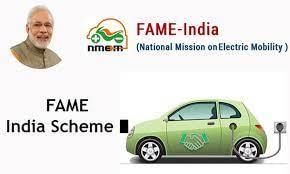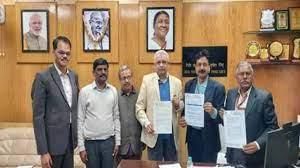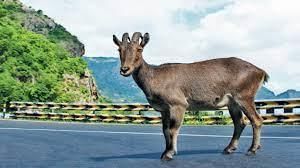UPSC Daily Current Affairs- 3rd January 2023 | Current Affairs & Hindu Analysis: Daily, Weekly & Monthly PDF Download
GS-II

Context
50 Electric Buses launched in Delhi with support under FAME India Phase II scheme of the Ministry of Heavy Industries.
About FAME India Phase II
- Full name of scheme: Faster Adoption and Manufacturing of Electric Vehicles in India Phase II (FAME India Phase II).
- Implementing agency: Department of Heavy Industry.
- Objective: Promotion of Electric and hybrid vehicle in the country by offering upfront Incentive on purchase of Electric vehicles and by establishing charging Infrastructure for electric vehicles.
- Salient features of the scheme:
- The scheme with total outlay of Rs 10,000 Crores over the period of three years (2019-20 to 2021-22) will be implemented with effect from 1st April 2019.
- This scheme is the expanded version of the present scheme titled 'FAME India1 which was launched on 1st April 2015, with total outlay of Rs. 895 crores.
- Target is to support 10 Lakhs e-2Wheeler, 5 Lakhs e-3Wheelers, 55000 4Wheelers and 7000 Buses.
- Under the scheme of FAME-II, the demand incentive for e-2W has been increased to Rs. 15,000/KWh from Rs. 10,000/KWh with an increase in cap from 20% to almost 40% of the cost of the vehicle to increase the adoption of e-2W.
- The phase II of FAME-India Scheme has been extended for a period of two years after 31st March 2022.
- Benefits: The scheme will help in addressing the issue of environmental pollution and fuel security.
Source: PIB
Govt proposes Policy on Online Gaming

Context
The Ministry of Electronics and IT proposed an amendment to bring online gaming under the ambit of the Information Technology (Intermediary Guidelines and Digital Media Ethics Code) Rules, 2021.
Regulating Online Gaming
The following draft amendments to the IT Act are being placed in the public for comments, feedback till January 17:
- Due diligence: Online gaming intermediaries shall exercise due diligence to ensure that online games with gambling, betting are not permitted.
- Withdrawals or refunds: Online gaming intermediaries shall inform users of policy for withdrawal or refund of deposit, distribution of winnings, applicable fees
- Self-Regulatory Organisation: SRO will determine what constitutes prohibited wagering
- Registration: Self-regulatory bodies will be registered with the MeitY
- Online games: Self-regulatory bodies may register online games of intermediaries that are members and meet prescribe criteria.
- Complaints’ redressal: Self-regulatory bodies will resolve complaints through a grievance redressal mechanism.
What is online gaming?
- Online gaming can refer to any type of game that someone can play through the Internet or over a computer network.
- Most of the time, it refers to video games played over the Internet, where multiple players are in different locations across the world.
- Online gaming also can refer to the idea of gambling over the Internet, through an online casino or an online poker room.
Types of gaming
- E-sports (well-organized electronic sports which include professional players) ex. Chess
- Fantasy sports (choosing real-life sports players and winning points based on players’ performance) ex. MPL cricket
- Skill-based (mental skill) ex. Archery
- Gamble (based on random activity) ex. Playing Cards, Rummy
Prospects of online gaming
- State List Subject: The state legislators are, vide Entry No. 34 of List II (State List) of the Seventh Schedule, given exclusive power to make laws relating to betting and gambling.
- Distinction in laws: Most Indian states regulate gaming on the basis of a distinction in law between ‘games of skill’ and ‘games of chance’.
- Classification on dominant element: As such, a ‘dominant element’ test is utilized to determine whether chance or skill is the dominating element in determining the result of the game.
- Linked economic activity: Staking money or property on the outcome of a ‘game of chance’ is prohibited and subjects the guilty parties to criminal sanctions.
- ‘Game of Skill’ debate: Placing any stakes on the outcome of a ‘game of skill’ is not illegal per se and may be permissible. It is important to note that the Supreme Court recognized that no game is purely a ‘game of skill’ and almost all games have an element of chance.
Need for regulation
- No comprehensive regulation: India currently has no comprehensive legislation with regards to the legality of online gaming or boundaries that specify applicable tax rates within the betting and gambling industry.
- Ambiguity of the sector: The gaming sector is nascent and is still evolving, and many states are bringing about legislation seeking to bring about some order in the online gaming sector.
- State list subject: Online gaming in India is allowed in most parts of the country. However, different states have their own legislation with regards to whether online gaming is permitted.
- Economic advantage: Well-regulated online gaming has its own advantages, such as economic growth and employment benefits.
Issues with online gaming
- Gaming addiction: Numerous people are developing an addiction to online gaming. This is destroying lives and devastating families.
- Compulsive gaming: Gaming by children is affecting their performance in schools and impacting their social lives & relationships with family members. Ex. PUBG
- Impact on psychological health: Online games like PUBG and the Blue Whale Challenge were banned after incidents of violence and suicide.
- Threat to Data privacy: Inadvertent sharing of personal information can lead to cases of cheating, privacy violations, abuse, and bullying.
- Betting and gambling: Online games based on the traditional ludo, arguably the most popular online game in India, have run into controversy, and allegations of betting and gambling.
Why hasn’t a comprehensive law yet materialized?
- Earlier, states like Tamil Nadu, Telangana, Andhra Pradesh, and Karnataka also passed laws banning online games.
- However, they were quashed by state High Courts on grounds that an outright ban was unfair to games of skill:
- Violation of fundamental rights of trade and commerce, liberty and privacy, speech and expression;
- Law being manifestly arbitrary and irrational insofar as it did not distinguish between two different categories of games, i.e. games of skill and chance;
- Lack of legislative Competence of State legislatures to enact laws on online skill-based games.
Source: The Hindu
‘SMART’ (Scope for Mainstreaming Ayurveda Research in Teaching Professionals) Program

Context
The National Commission for Indian System of Medicine (NCISM) and the Central Council for Research in Ayurvedic Sciences (CCRAS), the two prominent institutions under the Ministry of Ayush, Government of India for regulating medical education and conducting scientific research respectively, have launched ‘SMART’ (Scope for Mainstreaming Ayurveda Research in Teaching Professionals) program.
About 'SMART’ (Scope for Mainstreaming Ayurveda Research in Teaching Professionals) Program
- It is aimed to boost scientific research in priority healthcare research areas through Ayurveda colleges and hospitals.
- The proposed initiative is conceptualised with an objective to identify, support and promote innovative research ideas in healthcare research areas including Osteoarthritis, Iron Deficiency Anaemia, Chronic Bronchitis, Dyslipidemia, Rheumatoid Arthritis, Obesity, Diabetes Mellitus, Psoriasis, Generalised Anxiety Disorder, Non-alcoholic fatty liver disease (NAFLD).
- The eligible Ayurveda academic institutions may apply by 10 January, 2023.
- All details regarding contact information, eligibility criteria and application process has been shared to all recognized academic institutions and hospitals through NCISM.
- The ‘SMART’ program will motivate teachers for taking up projects in designated areas of healthcare research and create a large database.
Source: Times of India
Brazil

Context
The Prime Minister of India has congratulated Luiz Inácio Lula da Silva on assuming office as the President of Brazil.
About Brazil
- Brazil is the largest country in both South America and Latin America.
- Its capital is Brasília.
- It is bounded by the Atlantic Ocean on the east, and borders all other countries in South America except Ecuador and Chile.
- Brazil is a founding member of the United Nations, the G20, BRICS, Union of South American Nations, Mercosul etc.
- Brazil's physical features can be grouped into five main physiographic divisions
- The Guiana Highlands in the North
- The Amazon lowlands
- The Pantanal in the Central-West
- The Brazilian Highlands (including the extensive coastal ranges)
- The coastal lowlands
- The Brazilian Highlands
- The Brazilian Highlands are a system of plateaus, mountains, uplands.
- The highest point is Pico da Bandeira, located in the Espinhaço Mountain range.
- The Guiana Highlands
- The Guiana Highlands have their smaller southern parts cutting into Brazilian territory.
- The highest summit of the country is located here- Pico da Neblina.
- The Amazon River and Basin
- The Amazon River in South America is the largest river by discharge volume of water in the world.
- The Amazon River begins in the Andes Mountains and drains into the Atlantic Ocean.
- The Amazon basin is the part of South America drained by the Amazon River and its tributaries.
- The Amazon drainage basin is located in the countries of Bolivia, Brazil, Colombia, Ecuador, Guyana, Peru, Suriname and Venezuela.
- Most of the basin is covered by the Amazon Rainforest, also known as Amazonia, which is a dense tropical forest, and also the largest rainforest in the world.
- The Amazon Basin is a vast plain, with huge rivers intersecting its surface, coming from the Andes Mountains, the Brazilian Highlands and the Guyana Uplands.
- The basin is bordered by the Brazilian Highlands on the south, and the Guyana Upland on the north.
GS-III
The Future of Metaverse and AI

Context
The year 2022 was not the best for tech firms, yet we may innovative technologies emerge in future related to Metaverse and AI (Artificial Intelligence), which may raise concerns and present Opportunities.
- The year 2022 saw a lot of the shift in demand during and post the Covid-induced lockdowns.
- The year 2022 ended with near mayhem across most Silicon Valley companies, especially those in the Internet business.
What are the Ethical Concerns related to AI?
- The legal and ethical issues that confront society due to AI include privacy and surveillance, bias or discrimination, and potentially the philosophical challenge is the role of human judgment. Concerns about newer digital technologies becoming a new source of inaccuracy and data breaches have arisen as a result of its use.
- The other side of this technological revolution is a growing apprehension on the socio-political and economic implications of AI, specifically, the concerns about co-existence of these emerging technologies and core principles of modern democracies.
- Consequently, AI ethics and the safe and responsible application of AI are becoming front and centre of the technology revolution.
- Constitutional morality was envisioned as the cornerstone for AI ethics’ principles in India, thus, propelling our constitutional rights and ethos to the paramount consideration for deploying AI in a responsible manner.
What are the Principles of a Responsible AI?
- Safety and Reliability: AI systems must ensure reliability regarding their intended functions and must have built-in safeguards to ensure the safety of stakeholders.
- Equality: AI systems must be built keeping in mind that similar people in similar circumstances are treated equally.
- Inclusivity and Non-Discrimination: AI systems must be developed to be inclusive of all stakeholders, and must not discriminate through bias between stakeholders on religion, race, caste, sex, descent, place of birth or residence in matters of education, employment, access to public spaces etc.
- Privacy and Security: AI systems must ensure that the personal data of data subjects must be safe and secure, such that only authorised persons must access personal data for specified and necessary purposes, within a framework of sufficient safeguards to ensure this process.
- Principle of Transparency: The design and training of AI systems is key for its functioning. The system must be audited and be capable of external scrutiny to ensure that the deployment of the AI system is impartial, accountable and free from bias or inaccuracies.
- Principle of Accountability: Since there are various actors in the process of developing, deploying and operationalizing an AI system, the accountability structures for any effects, harms or damages by the AI system must be clearly set out in a publicly accessible and understandable manner.
- Protection and Reinforcement of Positive Human Values: This principle focuses on the possible deleterious effects of AI systems through collection of personal data for profiling, the use of AI systems in manners contrary to fundamental rights guaranteed by the Constitution of India.
Source: Indian Express
Nilgiri Tahr Conservation Project

Context
The Tamil Nadu government launched an initiative for the conservation of the Nilgiri Tahr, the State animal.
About Nilgiri Tahr Conservation Project
- Under The Nilgiri Tahr project, TN government plans to develop a better understanding of the Nilgiri Tahr population through-
- Surveys and radio telemetry studies;
- Reintroduce the Tahrs to their historical habitat;
- Address proximate threats; and
- Increase public awareness of the species.
- The project is to be implemented from 2022 to 2027.
- Furthermore, October 7 will be celebrated as ‘Niligiri Tahr Day’ in honour of E.R.C. Davidar, who was responsible for pioneering one of the first studies of the species in 1975.
Historic significance of Nilgiri Tahr
- There are multiple references to the Nilgiri Tahr in Tamil Sangam literature dating back to 2,000 years.
- The late Mesolithic (10,000-4,000 BC) paintings highlight the significance of the Tahr in folklore, culture and life.
- It was designated as the State animal in recognition of its ecological and cultural significance.
Source: The Hindu
|
44 videos|5271 docs|1113 tests
|
FAQs on UPSC Daily Current Affairs- 3rd January 2023 - Current Affairs & Hindu Analysis: Daily, Weekly & Monthly
| 1. What is the importance of current affairs in the UPSC exam? |  |
| 2. How can I stay updated with daily current affairs for the UPSC exam? |  |
| 3. Are there any specific topics within current affairs that are more important for the UPSC exam? |  |
| 4. How can I effectively integrate current affairs with my UPSC exam preparation? |  |
| 5. Can reading current affairs alone guarantee success in the UPSC exam? |  |





















